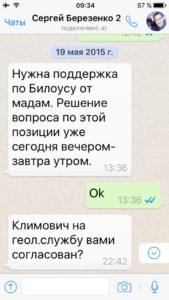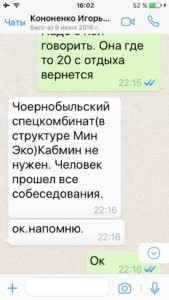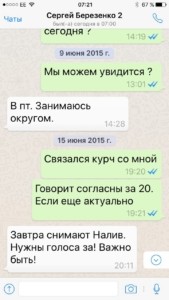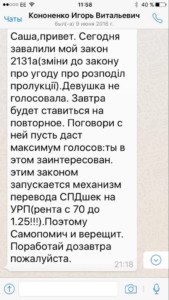Fugitive lawmaker Oleksandr Onyshchenko and Radical Party leader Oleg Lyashko have accused President Petro Poroshenko of wrongdoing involving the Ecology Ministry, which approves lucrative licenses for gas and oil exploration.
The Presidential Administration denied the allegations and accused Onyshchenko of cooperating with Russian intelligence agencies and getting a Russian passport, which he denies.
“All statements made by lawmaker Onyshchenko, who has been charged with corruption, are lies that are not confirmed by any evidence,” the administration told the Kyiv Post. “…This cause has gone beyond a personal campaign against Petro Poroshenko and has become an aspect of Russia’s information war against Ukraine.”
With respect to the Ecology Ministry, Onyshchenko and Lyashko accused Poroshenko of bribing lawmakers to appoint his loyalists so that the appointees would cancel certain mineral resource licenses.
Among those were licenses granted to two natural gas producers — Naftogazvydobuvannya, controlled by billionaire tycoon Rinat Akhmetov, and Burisma, a firm controlled by ex-Ecology Minister Mykola Zlochevsky. Hunter Biden, son of U.S. Vice President Joe Biden, and former Polish President Aleksander Kwasniewski are on Burisma’s board of directors.
When the attempt to revoke the licenses failed, Onyshchenko alleges that the president used his loyal prosecutors to freeze the assets of Burisma and Naftogazvydobuvannya. Onyshchenko claimed that Poroshenko extorted money from Akhmetov and Zlochevsky for unfreezing them. The licenses are active today.
Burisma and Naftogazvydobuvannya denied the allegations.
Critics have questioned Onyshchenko’s credibility because he has been charged with stealing Hr 1.6 billion ($64 million) from state-owned gas producer Ukrgazvydobuvannya, which he denies. He fled Ukraine before he was stripped of his parliamentary immunity in July.
He said on Dec. 1 he had given the U.S. Federal Bureau of Investigation information alleging corruption of Poroshenko and his inner circle. The Department of Justice has indirectly confirmed that its representatives had met with Onyshchenko, but issued a statement afterwards saying it would not cooperate with him in the future.
Shevchenko’s appointment
Onyshchenko told the Kyiv Post that, after his election as president, Poroshenko lobbied for the appointment of loyalists – Igor Shevchenko and Petro Matveyev – as ecology minister and head of the State Service for Geology and Mineral Resources, respectively.
Shevchenko formally represented Yulia Tymoshenko’s Batkyvshchyna, while Matveyev was formally a candidate from Oleg Lyashko’s Radical Party but effectively they would represent the interests of Poroshenko and Onyshchenko, he said.
Onyshchenko supposedly acted as an intermediary.
Poroshenko tried to use these appointees to cancel the mineral resource licenses of Burisma and Naftogazvydobuvannya in order to extort money from them, Onyshchenko claimed.
Shevchenko was eventually appointed in December 2014, while Matveyev’s appointment was blocked by Prime Minister Arseniy Yatsenyuk.
Shevchenko was fired in July 2015 amid a corruption scandal over his earlier flights on Onyshchenko’s private jet. He denies any wrongdoing.
Tymoshenko on Dec. 5 denied cooperating with Onyshchenko on Shevchenko’s appointment, saying his claim had been an effort to discredit her team.
But on the same day, Lyashko published what he said was a letter by Tymoshenko nominating Shevchenko for a minister’s job. He accused Tymoshenko of writing the letter in exchange for money, which she denied.
Shevchenko told the Kyiv Post he had not been aware of Poroshenko’s alleged lobbying for his candidacy.
“Of course, the president participated in this process,” he told the Kyiv Post. “But I don’t know who lobbied for what… I was told that my candidacy had been approved by the president.”
He also said he had been acquianted with Onyshchenko for a long time, and that Poroshenko had talked with Onyshchenko about him and asked him to talk to Shevchenko.
“We were checking the issuance of licenses to different companies ,but we did not have a task to target Naftogazvudobuvannya specifically,” Shevchenko said.
But he said Yatsenyuk had likely protected Akhmetov’s interests because he had prevented Matveyev’s appointment and blocked Shevchenko and Matveyev “from the opportunity to check the issuance of licenses, including those of Akhmetov’s company, Burisma or anyone else.”
Mineral resources agency
Onyshchenko said he had met with Poroshenko and Yatsenyuk in November 2014, and the president had demanded the appointment of Matveyev and deputy ecology ministers loyal to Poroshenko and Onyshchenko.
Yatsenyuk’s spokeswoman Olga Lappo neither confirmed nor denied that the meeting took place.
“Yatsenyuk did not appoint an Onyshchenko loyalist to the State Service for Geology and Mineral Resources despite the efforts to nominate him repeatedly by the ecology minister, who was fired due to suspected corruption,” she told the Kyiv Post. “On all other issues, we will comment to investigators.”
Meanwhile, Lyashko said in September 2015 that Poroshenko had repeatedly offered him bribes for the appointment of his candidate for the State Service for Geology and Mineral Resources.
“When I blocked Matveyev’s appointment, Poroshenko met me several times and tried to persuade me not to block it,” Lyashko told the Kyiv Post. “But I didn’t agree to this because I knew that Matveyev is an Onyshchenko loyalist.”
Onyshchenko claimed Poroshenko had offered $5 million to Lyashko, while Lyashko wanted $10 million, and they did not reach an agreement. Yatsenyuk blocked the appointment because he protected Akhmetov’s interests, Onyshchenko said.
However, Lyashko denied being interested in a bribe.
“This is utter nonsense,” he said. “On the contrary, I blocked this appointment when I found out that Ecology Minister Shevchenko nominated Matveyev, an Onyshchenko protege, as head of the State Service for Geology and Mineral Resources. I also demanded that Poroshenko fire Ecology Minister Shevchenko, who was nominated by Yulia Tymoshenko and lobbied for Onyshchenko’s interests.”

Lawmaker Serhiy Berezenko asking Onyshchenko whether he had approved the appointment of a Yaroslav Klymovych, CEO of Nadra Ukrainy. He also asks him to get votes for the appointment of Ihor Bilous as head of the State Property Fund in May 2015.
Onyshchenko sent to the Kyiv Post what he says is his smartphone correspondence with Poroshenko’s right-hand man and lawmaker Ihor Kononenko and Serhiy Berezenko, a lawmaker from the Poroshenko Bloc, about appointments at state firms and agencies reporting to the Ecology Ministry.
According to the messages, Kononenko discussed the appointment of the chief of a firm based in the Chernobyl Exclusion Zone, while Berezenko asked Onyshchenko whether he had authorized the appointment of Yaroslav Klymovych as CEO of Nadra Ukrainy, a state mineral resource firm.

Lawmaker Igor Kononenko discussing the appointment of Chernobylsky Spetskombinat’s CEO with Oleksandr Onyshchenko.
Prosecutors’ pressure
When the alleged efforts to revoke the licenses of Naftogazvydobuvannya and Burisma failed, prosecutors loyal to Poroshenko froze their assets and then unfroze them when the president received money from them, Onyshchenko claimed.
The Prosecutor General’s Office did not respond to a request for comment.
Naftogazvydobuvannya used to be co-owned by Poroshenko and his top ally and lawmaker Igor Kononenko but later it was acquired by lawmakers Nestor Shufrich and Mykola Rudkovsky and then by Akhmetov.
In 2015 Dmytro Sus, a prosecutor accused of links to Poroshenko’s allies Kononenko and Oleksandr Hranovsky, ordered the assets of Naftogazvydobuvannya to be frozen as part of a case into the kidnapping of the company’s CEO Oleh Seminsky. The company’s operations were blocked, and the freeze was deemed controversial because it happened three years after Seminsky’s kidnapping.
The assets were unfrozen by a court in December 2015, with prosecutors deciding not to dispute the decision. Meanwhile, in February 2016 a British Virgin Islands firm with unknown beneficiaries became a co-owner of Naftogazvydobuvannya.
Earlier this year Sus also ordered a freeze on the assets of Burisma and other firms controlled by Zlochevsky as part of the embezzlement case into another firm, Ukrgazvydobuvannya.
But later courts unfroze them, and Sus did not dispute the rulings. At the same time, Zlochevsky, who has been charged with unlawful enrichment, was taken off the wanted list at the request of Sus’ department in October 2016.
Burisma denied Onyshchenko’s claims in a statement on Dec. 29.
“The information in the article is untrue and is being spread to discredit Burisma Group,” the company said. “Such statements by third parties are provocations aimed at getting the group involved in Ukrainian politics.”
Burisma also denied having held any negotiations with Ukrainian politicians.
Akhmetov also denied the accusations.
“Onyshchenko’s claim that money was extorted from me in exchange for unfreezing Naftogazvydobuvannya’s assets is absolutely untrue,” he told the Kyiv Post in a written comment. “As far as claims by the Prosecutor General’s Office against Naftogazvydobuvannya are concerned, they have been resolved in a legal way.”
Onyshchenko claimed that Poroshenko had tried to extort $200 million from Naftogazvydobuvannya, and they settled at $180 million.
He also claimed that Poroshenko had wanted a $100 million payment from Zlochevsky, while Zlochevsky offered $50 million. Eventually they settled at about $80 million, he added.
Previously Burisma had also been supplying natural gas to a glass factory linked to Kononenko and Poroshenko free of charge, Onyshchenko said.
Ukrainska Pravda reported on Dec. 27, citing a market source, that Esko Pivnich, a Burisma subsidiary, was currently selling natural gas at a dumping price of Hr 7,400 to Hr 7,500 per 1,000 cubic meters. Onyshchenko claimed that, by selling gas at a below-market price, Zlochevsky was effectively paying a bribe to Poroshenko’s inner circle.
Meanwhile, Olga Vasilevskaya, a journalist at television channel 1+1, on Dec. 25 published what she claimed to be photos of Kononenko meeting in Vienna with Zlochevsky. Kononenko’s face is clearly visible, while the person identified by her as Zlochevsky is seen from behind.
The alleged meeting took place after Onyshchenko testified about Poroshenko’s alleged raid on Zlochevsky’s business while interrogated by anti-corruption prosecutors by Skype on Dec. 22.
Kononenko did not respond to a request for comment. Previously he has denied Onyshchenko’s accusations.
Coincidentally, Radio Liberty journalist Mykhailo Tkach on Dec. 22 photographed the cars of Poroshenko and Kononenko visiting the Security Service of Ukraine, a fact confirmed by SBU Chief Vasyl Hrytsak.
Bribery in parliament
Onyshchenko has also made sweeping claims about alleged corruption in parliament, including the buying of seats in the 2014 election – similar to allegations made by many others, including Poroshenko Bloc lawmaker Sergii Leshchenko and Dragon Capital CEO and European Business Association leader Tomas Fiala. Poroshenko’s administration denied the allegations.
Onyshchenko has accused Poroshenko, Kononenko and other allies of the president of using him as an intermediary to bribe lawmakers.

Lawmaker Serhiy Berezenko asks Oleksandr Onyshchenko to get votes for the resignation of Security Service of Ukraine Chief Valentyn Nalyvaichenko
As proof of his claims, Onyshchenko showed to the Kyiv Post alleged text messages in which Berezenko asks him to get votes for the resignation of Valentyn Nalyvaichenko as head of the Security Service of Ukraine in June 2015 and the appointment of Ihor Bilous as head of the State Property Fund in May 2015.
Another alleged message shows Kononenko asking Onyshchenko to get votes for a bill on production sharing agreements in June 2016.

Lawmaker Ihor Kononenko asking Oleksandr Onyshchenko to get votes for a bill on production sharing agreements.
Additionally, Onyshchenko has said that he had given $6 million to David Zhvania, a member of Poroshenko’s election headquarters in 2014, for the Poroshenko Bloc’s campaign in order to get registered as a candidate despite his violation of residency rules.
Zhvania did not respond to a request for comment.
Another one making the allegations is Artem Bidenko, an unsuccessful candidate for parliament from the Poroshenko Bloc in 2014 and now a deputy information policy minister.
Bidenko told the Slidtvto.info investigative show in 2014 that Zhvania was responsible for selling parliamentary seats. He said then between 10 and 20 seats had been sold.
The seats, including that of lawmaker Glib Zagory, were sold for between $5 million and $10 million, Bidenko said. Zagoriy has denied the claim and filed a libel lawsuit against Bidenko.
Bidenko backtracked on Dec. 21, saying that he had had no evidence to back up his earlier claims and that he had made a mistake.
However, others – such as lawmaker Leshchenko — say the bribes paid are fueling today’s corruption as lawmakers seek to recoup their payments.
U.S. government
Onyshchenko said on Dec. 1 that he had transferred recordings implicating Poroshenko in corruption to the Federal Bureau of Investigation.
Peter Carr, a spokesman for the Department of State, told the Kyiv Post on Dec. 16 that “the U.S. Department of Justice has no plans to have further meetings or communications with Mr. Onyshchenko.”
Despite this, Onyshchenko said on Facebook on Dec. 19 that U.S. intelligence agents had had him pass a polygraph test on that day. Carr said he could not comment on the claim.
Onyshchenko sent to the Kyiv Post what he says is a copy of his agreement with the Department of State signed by Ephraim Wernick, a trial attorney at the Department of Justice’s fraud section representing Andrew Weissman, chief of the section.
This article was updated on Dec. 30 to add comment from Burisma and Naftogazvydobuvannya.
